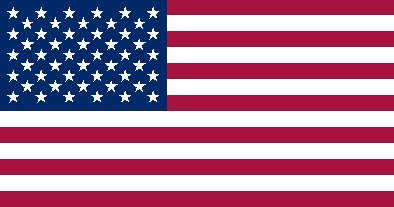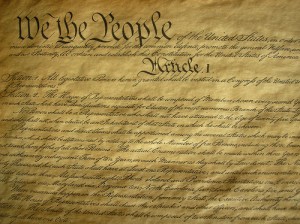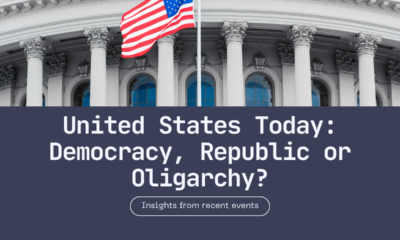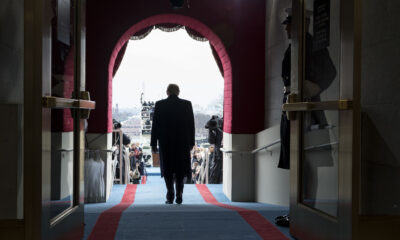Constitution
The Simple Miracle of America

Christmas is not about candy canes, Easter is not about chocolate bunnies, and Independence Day is not about hamburgers. Each of these three holidays has been commercialized to the point of obscuring the miracles that each represents. The founding of our nation upon the Judeo-Christian principle that individuals have rights which come from God and not government is the simple miracle of America.
On July 4th, we celebrate our Declaration of Independence – the document which could be considered the true preamble of our U.S. Constitution. It is that spirit which enables freedom and prosperity to grow. Our U.S. Constitution was then drafted for the sole purpose of securing our “unalienable Rights” for future generations; spelling out exactly what government can and can not do. With our President, Congress, and Supreme Court blatantly ignoring most of those limitations, “We The People” now have less independence, less freedom, and less prosperity to commemorate.
The critical issues which are tearing apart the social fabric of America, endangering our national security, and bankrupting the American people, can be resolved quickly if all three branches of government will only obey the U.S. Constitution. If they did so, we would once again have sound money without inflation, no national debt, less meddling in foreign nations, our troops home to secure our own borders and ports, far less burdensome regulations on businesses, jobs and prosperity, energy self-sufficiency, individual liberty, personal privacy – and more.
Thomas Jefferson wrote:
Can the liberties of a nation be sure when we remove their only firm basis, a conviction in the minds of people, that these liberties are a gift from God?
Have we cast off the faith of our founding fathers and forgotten how their sacrifices and His Divine intervention gave us the greatest form of government the world has ever seen?
This July 4th, before you take that first bite of hamburger, consider taking a moment to reverently read to your loved ones this small portion from the Declaration:
We hold these truths to be self-evident, that all men are created equal; that they are endowed by their Creator with certain unalienable Rights; that among these are Life, Liberty and the pursuit of Happiness – That to secure these rights, Governments are instituted among Men to secure these rights, deriving their just powers from the consent of the governed.
We have a responsibility to our children and grandchildren to return to America’s bedrock belief, reclaim our U.S. Constitution, and restore personal liberty.
May God continue to bless America.
[amazon_carousel widget_type=”ASINList” width=”500″ height=”250″ title=”” market_place=”US” shuffle_products=”True” show_border=”False” asin=”B00375LOEG, 0451947673, 0800733940, 0062073303, 1595230734, 1936218003, 0981559662, 1935071874, 1932172378″ /]
-

 Executive4 days ago
Executive4 days agoSecret Service chief gets no solace
-

 Executive3 days ago
Executive3 days agoWaste of the Day: Louisville Taxpayers Pay Nearly $600,000 For Empty Building’s Maintenance, Security
-

 Guest Columns4 days ago
Guest Columns4 days agoFear Itself: Democrats’ Favorite Strategy Caused Their Current Chaos
-

 Executive3 days ago
Executive3 days agoWhere is Joe Biden – or Jill?
-

 Executive1 day ago
Executive1 day agoWaste of the Day: Throwback Thursday: Cities Used Crime Prevention Funds on Soccer Games, Paper Shredding
-

 Executive2 days ago
Executive2 days agoFacile and politically motivated suggestions
-

 Civilization5 days ago
Civilization5 days agoBuild Iron Dome in the United States To Prepare for Israel’s Worst Day
-

 Executive1 day ago
Executive1 day agoBiden makes farewell whisper











Good. Now, as Terry A. Hurlbut has said on another article: “Now pay attention: the Abrogation Principle says that whenever two verses conflict, the one written later takes precedence.” and then read the Treaty of Tripoli, where it says “As the government of the United States of America is not, in any sense, founded on the Christian Religion”.
Then read your history, and learn that 25 December was a Mithraic holiday originally, and that every single thing in Christianity was stolen from other cultures, religions and traditions.
The abrogation principle is for Islam.
The 25th of December is on the Gregorian calendar, created long after the Mitran mystery cult.
People who believe that “getting back to our roots” means embracing the belief that the United States was explicitly founded as a Christian nation are mistaken. There’s nothing about this view that is anti-Christian, it’s just based on straightforward facts.
The Declaration may refer to people as being created by a supernatural being, and that was certainly a prevailing viewpoint in the colonies at that time. Look at the very next statement though – “That to secure these rights, Governments are instituted among Men to secure these rights, deriving their just powers from the consent of the governed.”
Governments are the creation of people, not God, and derive their power from people being governed, not God. The USA was founded as a nation of Christians (among other faiths), and not as a Christian nation.
This nation was founded by people who included Christians escaping persecution by Christians of other denominations. These people were all too aware of the injustices that can take place when people invoke divine right to impose their views on others.
If we’re to get back to being a “Christian nation”, which type of Christianity is that supposed to be – Catholic, Lutheran, Baptist, Coptic, Eastern Orthodox? Iraq is supposedly a Muslim nation, and look at how the differences between Sunni and Shiite have torn at the country over the past decade.
When it came time to actually draft the Constitution itself, the framers were very careful to base it on a secular foundation, and to even add clauses prohibiting religious tests for Federal office holders. We are a nation of the people, by the people, and for the people, and one of the great blessings of being an American is that all of these people can worship any faith of their choosing freely.
So on July 4th, say a prayer of thanksgiving if that’s what your faith moves you to do, and take pride in being part of a country where that prayer comes from your heart wanting to do it and not from an authority making you do it.
And on September 17th, pause for a minute to appreciate what the spark lit in 1776 grew into by 1787.
Are we talking about the same document that allowed the enslavement of Africans and the disenfranchisement of women?
[…] District 2 Constitutional candidate Peter F. Boyce has already suggested a third reason. Today, Independence Day is too commercial. The Fourth of July, to some people, is a day to get a […]
“We hold these truths to be self-evident, that all men are created equal”
And yet with the same breath you would deny certain people basic rights, such as the right to marry.
Or is it in a case of some people are more equal than others?
Please consider the following …
Lest we forget the closing of the Declaration of Independence: “And for the support of this declaration, with a firm reliance on the protection of DIVINE PROVIDENCE, we mutually pledge to each other our lives, our fortunes and our sacred honor.”
Or Patrick Henry: “It cannot be emphasized too strongly or too often that this great nation was founded, not by religionists, but by Christians; not on religions, but on the gospel of Jesus Christ. For this very reason peoples of other faiths have been afforded asylum, prosperity, and freedom of worship here.” (Rabbi Daniel Lapin quotes this often and is grateful for the liberty other faiths enjoy because we are a Christian nation.)
Or President Reagan’s 1983 Proclamation of the Year of the Bible (link to reagan.utexas.edu)
The Bible and its teachings helped form the basis for the Founding Fathers’ abiding belief in the inalienable rights of the individual, rights which they found implicit in the Bible’s teachings of the inherent worth and dignity of each individual. This same sense of man patterned the convictions of those who framed the English system of law inherited by our own Nation, as well as the ideals set forth in the Declaration of Independence and the Constitution…
Many of our greatest national leaders — among them Presidents Washington, Jackson, Lincoln, and Wilson — have recognized the influence of the Bible on our country’s development. The plainspoken Andrew Jackson referred to the Bible as no less than “the rock on which our Republic rests.” Today our beloved America and, indeed, the world, is facing a decade of enormous challenge. As a people we may well be tested as we have seldom, if ever, been tested before. We will need resources of spirit even more than resources of technology, education, and armaments. There could be no more fitting moment than now to reflect with gratitude, humility, and urgency upon the wisdom revealed to us in the writing that Abraham Lincoln called “the best gift God has ever given to man . . . But for it we could not know right from wrong.
The Congress of the United States, in recognition of the unique contribution of the Bible in shaping the history and character of this Nation, and so many of its citizens, has by Senate Joint Resolution 165 authorized and requested the President to designate the year 1983 as the “Year of the Bible.”
Now, Therefore, I, Ronald Reagan, President of the United States of America, in recognition of the contributions and influence of the Bible on our Republic and our people, do hereby proclaim 1983 the Year of the Bible in the United States. I encourage all citizens, each in his or her own way, to reexamine and rediscover its priceless and timeless message.
In Witness Whereof, I have hereunto set my hand this third day of February, in the year of our Lord nineteen hundred and eighty-three, and of the Independence of the United States of America the two hundred and seventh.
Ronald Reagan
It doesn’t matter what certain people said after the fact-the simple truth is that America was founded as a state free from religion. If the founders had wanted religion to be a part of the constitution, they would have put it there.
The first amendment is pretty clear about this, and only right-wing fundies ever say different.
Please explain how the 1st amendment is opposed to religion. What it says is that Gov’t. is prohibited from making any law which establishes a particular denomination as the state religion as was the case in England.
In response to “It doesn’t matter what certain people said after the fact”
Here’s an Independence Day message from someone who WAS there and lived more of our American history than most of us read about … CHARLES CARROLL, 1737-1832 (95 years), delegate to the Annapolis Convention, Signer of the Declaration of Independence, selected as a delegate to the Constitutional Convention, Framer of the Bill of Rights, and U.S. Senator for Maryland:
“On the mercy of my Redeemer I rely for salvation and on His merits, not on the works I have done in obedience to His precepts.”
“Grateful to Almighty God for the blessings which, through Jesus Christ Our Lord, He had conferred on my beloved country in her emancipation and on myself in permitting me, under circumstance of mercy, to live to the age of 89 years, and to survive the fiftieth year of independence, adopted by Congress on the 4th of July 1776, which I originally subscribed on the 2nd day of August of the same year and of which I am now the last surviving signer.”
“I, Charles Carroll … give and bequeath my soul to God who gave it, my body to the earth, hoping that through and by the merits, sufferings, and meditation of my only Savior and Jesus Christ, I may be admitted into the Kingdom prepared by God for those who love, fear and truly serve Him.”
Yes, that’s nice. Here’s a neat law we have from the Treaty of Tripoli:
Art. 11. As the Government of the United States of America is not, in any sense, founded on the Christian religion,—as it has in itself no character of enmity against the laws, religion, or tranquility, of Mussulmen,—and as the said States never entered into any war or act of hostility against any Mahometan nation, it is declared by the parties that no pretext arising from religious opinions shall ever produce an interruption of the harmony existing between the two countries.
I assume, of course, that you understand that according to Article 6 of the Constitution, all treaties are effectively laws in America. America is a nation with a lot of Christians, and culturally has certainly been influenced by Christianity, but we are not a Christian nation, explicitly so by our own laws and Constitution. The same goes for any other religion.
Look at the history of Europe during the colonial era. That will explain why we have a secular government.
Thank you, John, for bringing the Treaty of Tripoli into the discussion. Have you read the material, researched the endnotes from David Barton – 01/2000?
link to wallbuilders.com
The 1797 Treaty of Tripoli, specifically article XI, is commonly misused in editorial columns, articles, as well as in other areas of the media, both Christian and secular. We have received numerous questions from people who have been misled by the claims that are being made, namely, that America was not founded as a Christian nation. Advocates of this idea use the Treaty of Tripoli as the foundation of their entire argument, and we believe you deserve to know the truth regarding this often misused document. The following is an excerpt from David Barton’s book Original Intent:
To determine whether the “Founding Fathers” were generally atheists, agnostics, and deists, one must first define those terms. An “atheist” is one who professes to believe that there is no God; 1 an “agnostic” is one who professes that nothing can be known beyond what is visible and tangible; 2 and a “deist” is one who believes in an impersonal God who is no longer involved with mankind. (In other words, a “deist” embraces the “clockmaker theory” 3 that there was a God who made the universe and wound it up like a clock; however, it now runs of its own volition; the clockmaker is gone and therefore does not respond to man.) Today the terms “atheist,” “agnostic,” and “deist” have been used together so often that their meanings have almost become synonymous. In fact, many dictionaries list these words as synonym. 4
Those who advance the notion that this was the belief system of the Founders often publish information attempting to prove that the Founders were irreligious. 5 One of the quotes they set forth is the following:
The government of the United States is in no sense founded on the Christian religion. GEORGE WASHINGTON
The 1797 Treaty of Tripoli is the source of Washington’s supposed statement. Is this statement accurate? Did this prominent Founder truly repudiate religion? An answer will be found by an examination of its source. That treaty, one of several with Tripoli, was negotiated during the “Barbary Powers Conflict,” which began shortly after the Revolutionary War and continued through the Presidencies of Washington, Adams, Jefferson, and Madison. 6 The Muslim Barbary Powers (Tunis, Morocco, Algiers, and Tripoli) were warring against what they claimed to be the “Christian” nations (England, France, Spain, Denmark, and the United States). In 1801, Tripoli even declared war against the United States, 7 thus constituting America’s first official war as an established independent nation.
Throughout this long conflict, the four Barbary Powers regularly attacked undefended American merchant ships. Not only were their cargoes easy prey but the Barbary Powers were also capturing and enslaving “Christian” seamen 8 in retaliation for what had been done to them by the “Christians” of previous centuries (e.g., the Crusades and Ferdinand and Isabella’s expulsion of Muslims from Granada 9). In an attempt to secure a release of captured seamen and a guarantee of unmolested shipping in the Mediterranean, President Washington dispatched envoys to negotiate treaties with the Barbary nations. 10 (Concurrently, he encouraged the construction of American naval warships 11 to defend the shipping and confront the Barbary “pirates” – a plan not seriously pursued until President John Adams created a separate Department of the Navy in 1798.)
The American envoys negotiated numerous treaties of “Peace and Amity” 12 with the Muslim Barbary nations to ensure “protection” of American commercial ships sailing in the Mediterranean. 13 However, the terms of the treaty frequently were unfavorable to America, either requiring her to pay hundreds of thousands of dollars of “tribute” (i.e., official extortion) to each country to receive a “guarantee” of safety or to offer other “considerations” (e.g., providing a warship as a “gift” to Tripoli, 14 a “gift” frigate to Algiers, 15 paying $525,000 to ransom captured American seamen from Algiers, 16 etc. 17). The 1797 treaty with Tripoli was one of the many treaties in which each country officially recognized the religion of the other in an attempt to prevent further escalation of a “Holy War” between Christians and Muslims. 18 Consequently, Article XI of that treaty stated:
As the government of the United States of America is not in any sense founded on the Christian religion as it has in itself no character of enmity [hatred] against the laws, religion or tranquility of Musselmen [Muslims] and as the said States [America] have never entered into any war or act of hostility against any Mahometan nation, it is declared by the parties that no pretext arising from religious opinions shall ever produce an interruption of the harmony existing between the two countries. 19
This article may be read in two manners. It may, as its critics do, be concluded after the clause “Christian religion”; or it may be read in its entirety and concluded when the punctuation so indicates. But even if shortened and cut abruptly (“the government of the United States is not in any sense founded on the Christian religion”), this is not an untrue statement since it is referring to the federal government.
Recall that while the Founders themselves openly described America as a Christian nation (demonstrated in chapter 2 of Original Intent), they did include a constitutional prohibition against a federal establishment; religion was a matter left solely to the individual States. Therefore, if the article is read as a declaration that the federal government of the United States was not in any sense founded on the Christian religion, such a statement is not a repudiation of the fact that America was considered a Christian nation.
Reading the clause of the treaty in its entirety also fails to weaken this fact. Article XI simply distinguished America from those historical strains of European Christianity which held an inherent hatred of Muslims; it simply assured the Muslims that the United States was not a Christian nation like those of previous centuries (with whose practices the Muslims were very familiar) and thus would not undertake a religious holy war against them.
This latter reading is, in fact, supported by the attitude prevalent among numerous American leaders. The Christianity practiced in America was described by John Jay as “wise and virtuous,” 20 by John Quincy Adams as “civilized,” 21 and by John Adams as “rational.” 22 A clear distinction was drawn between American Christianity and that of Europe in earlier centuries. As Noah Webster explained:
The ecclesiastical establishments of Europe which serve to support tyrannical governments are not the Christian religion but abuses and corruptions of it. 23
Daniel Webster similarly explained that American Christianity was:
Christianity to which the sword and the fagot [burning stake or hot branding iron] are unknown – general tolerant Christianity is the law of the land! 24
Those who attribute the Treaty of Tripoli quote to George Washington make two mistakes. The first is that no statement in it can be attributed to Washington (the treaty did not arrive in America until months after he left office); Washington never saw the treaty; it was not his work; no statement in it can be ascribed to him. The second mistake is to divorce a single clause of the treaty from the remainder which provides its context. It would also be absurd to suggest that President Adams (under whom the treaty was ratified in 1797) would have endorsed or assented to any provision which repudiated Christianity. In fact, while discussing the Barbary conflict with Jefferson, Adams declared:
The policy of Christendom has made cowards of all their sailors before the standard of Mahomet. It would be heroical and glorious in us to restore courage to ours. 25
Furthermore, it was Adams who declared:
The general principles on which the fathers achieved independence were. . . . the general principles of Christianity. . . . I will avow that I then believed, and now believe, that those general principles of Christianity are as eternal and immutable as the existence and attributes of God; and that those principles of liberty are as unalterable as human nature. 26
Adams’ own words confirm that he rejected any notion that America was less than a Christian nation.
Additionally, the writings of General William Eaton, a major figure in the Barbary Powers conflict, provide even more irrefutable testimony of how the conflict was viewed at that time. Eaton was first appointed by President John Adams as “Consul to Tunis,” and President Thomas Jefferson later advanced him to the position of “U. S. Naval Agent to the Barbary States,” authorizing him to lead a military expedition against Tripoli. Eaton’s official correspondence during his service confirms that the conflict was a Muslim war against a Christian America.
For example, when writing to Secretary of State Timothy Pickering, Eaton apprised him of why the Muslims would be such dedicated foes:
Taught by revelation that war with the Christians will guarantee the salvation of their souls, and finding so great secular advantages in the observance of this religious duty [the secular advantage of keeping captured cargoes], their [the Muslims’] inducements to desperate fighting are very powerful. 27
Eaton later complained that after Jefferson had approved his plan for military action, he sent him the obsolete warship “Hero.” Eaton reported the impression of America made upon the Tunis Muslims when they saw the old warship and its few cannons:
[T]he weak, the crazy situation of the vessel and equipage [armaments] tended to confirm an opinion long since conceived and never fairly controverted among the Tunisians, that the Americans are a feeble sect of Christians. 28
In a later letter to Pickering, Eaton reported how pleased one Barbary ruler had been when he received the extortion compensations from America which had been promised him in one of the treaties:
He said, “To speak truly and candidly . . . . we must acknowledge to you that we have never received articles of the kind of so excellent a quality from any Christian nation.” 29
When John Marshall became the new Secretary of State, Eaton informed him:
It is a maxim of the Barbary States, that “The Christians who would be on good terms with them must fight well or pay well.” 30
And when General Eaton finally commenced his military action against Tripoli, his personal journal noted:
April 8th. We find it almost impossible to inspire these wild bigots with confidence in us or to persuade them that, being Christians, we can be otherwise than enemies to Musselmen. We have a difficult undertaking! 31
May 23rd. Hassien Bey, the commander in chief of the enemy’s forces, has offered by private insinuation for my head six thousand dollars and double the sum for me a prisoner; and $30 per head for Christians. Why don’t he come and take it? 32
Shortly after the military excursion against Tripoli was successfully terminated, its account was written and published. Even the title of the book bears witness to the nature of the conflict:
The Life of the Late Gen. William Eaton . . . commander of the Christian and Other Forces . . . which Led to the Treaty of Peace Between The United States and The Regency of Tripoli 33
The numerous documents surrounding the Barbary Powers Conflict confirm that historically it was always viewed as a conflict between Christian America and Muslim nations. Those documents completely disprove the notion that any founding President, especially Washington, ever declared that America was not a Christian nation or people. (Chapter 16 of Original Intent will provide numerous additional current examples of historical revisionism.)
Endnotes
American Heritage Dictionary, 2nd College Edition, s.v. “atheism.”
Id., s.v. “agnostic.”
Id., s.v. “deism”; see also American College Dictionary (1947), s.v. “deism.”
Webster’s New World Dictionary of the American Language (1964), see synonym for “deist”; Webster’s Seventh New Collegiate Dictionary (1963), see synonym for “atheism”; The Century Dictionary and Cyclopedia (1895), Vol. I, see synonym for “atheist”; Funk & Wagnalls Standard Dictionary of the English Language (1966), see synonyms for “skeptic.”
Society of Separationists, “Did you know that these great American thinkers all rejected Christianity?” (Austin, TX: American Atheist Center); see also Los Angeles Times, August 3, 1995, p. B-9, “America’s Unchristian Beginnings,” Steven Morris.
Naval Documents Related to the United States Wars with the Barbary Powers, Claude A. Swanson, editor (Washington: Government Printing Office, 1939), Vol. I, p. V.
Glen Tucker, Dawn Like Thunder: The Barbary Wars and the Birth of the U. S. Navy (Indianapolis: Bobbs-Merrill Company, 1963), p. 127.
A General View of the Rise, Progress, and Brilliant Achievements of the American Navy, Down to the Present Time (Brooklyn, 1828), pp. 70-71.
Tucker, p. 50.
President Washington selected Col. David Humphreys in 1793 as sole commissioner of Algerian affairs to negotiate treaties with Algeria, Tripoli and Tunis. He also appointed Joseph Donaldson, Jr., as Consul to Tunis and Tripoli. In February of 1796, Humphreys delegated power to Donaldson and/or Joel Barlow to form treaties. James Simpson, U. S. Consul to Gibraltar, was dispatched to renew the treaty with Morocco in 1795. On October 8, 1796, Barlow commissioned Richard O’Brien to negotiate the treaty of peace with Tripoli. See, for example, Ray W. Irwin, The Diplomatic Relations of the United States with the Barbary Powers (Chapel Hill: The University of North Carolina Press, 1931), p. 84.
J. Fenimore Cooper, The History of the Navy of the United States of America (Philadelphia: Thomas, Cowperthwait & Co., 1847), pp. 123-124; see also A Compilation of the Messages and Papers of the Presidents: 1789-1897, James D. Richardson, editor (Washington, DC: Published by Authority of Congress, 1899), Vol. I, pp. 201-202, from Washington’s Eighth Annual Address of December 7, 1796.
See, for example, the treaty with Morocco: ratified by the United States on July 18, 1787. Treaties and Other International Agreements of the United States of America: 1776-1949, Charles I. Bevans, editor (Washington, DC: Department of State, 1968-1976), Vol. IX, pp. 1278-1285; Algiers: concluded September 5, 1795; ratified by the U. S. Senate March 2, 1796; see also, “Treaty of Peace and Amity” concluded June 30 and July 6, 1815; proclaimed December 26, 1815, Treaties and Conventions Concluded Between the United States of America and Other Powers Since July 4, 1776 (Washington, DC: Government Printing Office, 1889), pp. 1-15; Tripoli: concluded November 4, 1796; ratified June 10, 1797; see also, “Treaty of Peace and Amity” concluded June 4, 1805; ratification advised by the U. S. Senate April 12, 1806. Treaties, Conventions, International Acts, Protocols and Agreements between the United States of America and Other Powers: 1776-1909, William M. Malloy, editor (Washington, DC: Government Printing Office, 1910), Vol. II, pp. 1785-1793; Tunis: concluded August 1797; ratification advised by the Senate, with amendments, March 6, 1798; alterations concluded March 26, 1799; ratification again advised by the Senate December 24, 1799. Treaties, Conventions, International Acts, Protocols and Agreements between the United States of America and Other Powers: 1776-1909, William M. Malloy, editor (Washington, DC: Government Printing Office, 1910), Vol. II, pp. 1794-1799.
Gardner W. Allen, Our Navy and the Barbary Corsairs (Boston: Houghton, Mifflin and Company, 1905), pp. 33, 45, 56, 60.
Allen, p. 66.
Allen, p. 57.
Allen, p. 56.
See, for example, Report of the Committee of Claims, to Whom was Referred, on the Twentieth Instant the Petition of William Eaton (Washington, DC: A&G Way, 1804), pp. 6-34, “Statement Supported by Document Accompanying the Petition of William Eaton, presented the 20th of February, 1804,” Documents Respecting the Application of Hamet Caramalli, Ex-Bashaw of Tripoli (Washington, DC: Dwane & Son), pp. 53-54, letter from Secretary of State to James Cathcart, April 9, 1803, Documents Respecting the Application of Hamet Caramalli, Ex-Bashaw of Tripoli (Washington, DC: Dwane & Son), pp. 54-55, letter from the Secretary of State to Tobias Lear, June 6, 1804, Documents Respecting the Application of Hamet Caramalli, Ex-Bashaw of Tripoli (Washington, DC: Dwane & Son), pp. 71- 72, letter from Tobias Lear to James Madison, Secretary of State, July 5, 1805, Documents Respecting the Application of Hamet Caramalli, Ex-Bashaw of Tripoli (Washington, DC: Dwane & Son), pp. 80-81, letter from Tobias Lear to James Madison, July 5, 1805. All of these mention specific amounts paid to the Barbary powers for ransoms, as well as the numbers of ships and other supplies that was sent.
(See general bibliographic information from footnote 16 for each of these references) Morocco: see Articles 10, 11, 17, and 24; Algiers: See Treaty of 1795, Article 17, and Treaty of 1815, Article 17; Tripoli: See Treaty of 1796, Article 11, and Treaty of 1805, Article 14; Tunis: See forward to Treaty.
Acts Passed at the First Session of the Fifth Congress of the United States of America (Philadelphia: William Ross, 1797), pp. 43-44.
John Jay, Correspondence and Public Papers of John Jay, Henry Johnston, editor (New York: G. P. Putnam’s Sons, 1893), Vol. IV, p. 491, Address to the Annual Meeting of the American Bible Society, May 8, 1823.
John Quincy Adams,An Oration Delivered Before the Inhabitants of the Town of Newburyport at Their Request on the Sixty-First Anniversary of the Declaration of Independence (Newburyport: Charles Whipple, 1837), p. 17.
John Adams, The Works of John Adams, Second President of the United States, Charles Francis Adams, editor (Boston: Little, Brown and Company, 1856), Vol. IX, p. 121, in a speech to both houses of Congress, November 23, 1797.
Noah Webster, History of the United States (New Haven: Durrie & Peck, 1832), p. 339.
Daniel Webster, Mr. Webster’s Speech in Defence of the Christian Ministry and In Favor of the Religious Instruction of the Young. Delivered in the Supreme Court of the United States, February 10, 1844, in the Case of Stephen Girard’s Will (Washington, DC: Gales and Seaton, 1844), p. 52.
John Adams, Works, Vol. VIII, p. 407, to Thomas Jefferson on July 3, 1786.
John Adams, Works, Vol. X, pp. 45-46, to Thomas Jefferson on June 28, 1813.
Charles Prentiss, The Life of the Late Gen. William Eaton: Several Years an Officer in the United States’ Army Consul at the Regency of Tunis on the Coast of Barbary, and Commander of the Christian and Other Forces that Marched from Egypt Through the Desert of Barca, in 1805, and Conquered the City of Derne, Which Led to the Treaty of Peace Between the United States and the Regency of Tripoli (Brookfield: Merriam & Company, 1813), pp. 92-93, from General Eaton to Timothy Pickering, June 15, 1799.
Prentiss, p. 146, from General Eaton to Mr. Smith, June 27, 1800.
Prentiss, p. 150, from General Eaton to Timothy Pickering on July 4, 1800.
Prentiss, p. 185, from General Eaton to General John Marshall, September 2, 1800.
Prentiss, p. 325, from Eaton’s journal, April 8, 1805.
Prentiss, p. 334, from Eaton’s journal, May 23, 1805.
Prentiss. See also, Report of the Committee to Whom was Recommended on the Twenty-Sixth Ultimo A Resolution Respecting William Eaton (Washington, DC: A&C Way, 1806), January 8, 1806.
Congratulations, you’ve managed to copy and paste an article of questionable scholarship. I see a straw man right off the bat, a No True Scotsman a little later, what may or may not be quote-mining, and it starts with the conclusion that America was a Christian nation and sets out trying to prove that point to begin with (as opposed to what real scholars do, which is to start with the evidence and form an opinion later).
I never said that the Founders were irreligious. They weren’t. But they did make it clear that we were explicitly not a nation without any sort of established religion, Christianity included. This is the point I’m trying to make.
Also, copying and pasting articles you found off the internet isn’t a great way to argue with the letter of the law, especially when the article you find makes a rather weak case, even conceding the point I’m trying to make: “But even if shortened and cut abruptly (“the government of the United States is not in any sense founded on the Christian religion”), this is not an untrue statement since it is referring to the federal government.”
Also, Abigail Adams was capable of making her own argument, and one that didn’t boil down to the endless quoting of other people.
What is wrong with stoning your kid, cutting off their heads or a host of other 7th century barbaric actions by those that believe in Shariah/Islamic law/finance?
Sadly, people like Terry pick and choose the bits from the constitution that suit their purpose, much like they choose bits from the Bible.
The Bible says homosexuality is an abomination, but it also says you can take your unruly kids to the edge of town and stone them to death. That bit, however, they handily ignore as “outdated.”
Why are you arguing about religion, when the topic of the day is freedom and liberty and independence?
As long as you can be so easily distracted from the importance of freedom and liberty, you will continue to cede it to this encroaching, consuming federal government!
Bind it down! Cut off the head of the beast ( ie.cut off the money!), and it will either retreat to its proper cage (the Constitution), or die. Right now, I would consider either option worth while!
GP has the same rights as any other legal citizen of this
USA. I think he’s looking in the wrong document for condoning his chosen lifestyle, though.
Patti, that whooshing sound you hear is the point going past as you miss it.
Good Grief!!!! Get a grip. Look at the facts. The influnce of the Bible in the formation of this country is well documented. The Bible is the foundation of Christianity. We are a Christian Nation. We are tolerant of all religions. We do not now nor ever will have a state religion. The Constitution doesn’t say freedom FROM religion, it says freedom OF religion. Thank God for our freedom and pray to God that we can keep it.
“Good grief” indeed, because when you look at the facts, specifically the Constitution, the actual governmental structure of the United States was NOT founded as a Christian Nation, and there’s no mention of God, the Creator, or anything comparable in the document. The founders included Christians, but they deliberately chose to found a secular government. Why do you think they explicitly added a clause prohibiting religious tests for holding office?
I’m always puzzled that “people of faith” don’t seem to have much faith in people being able to find their spiritual answers without the government reinforcing it for them.